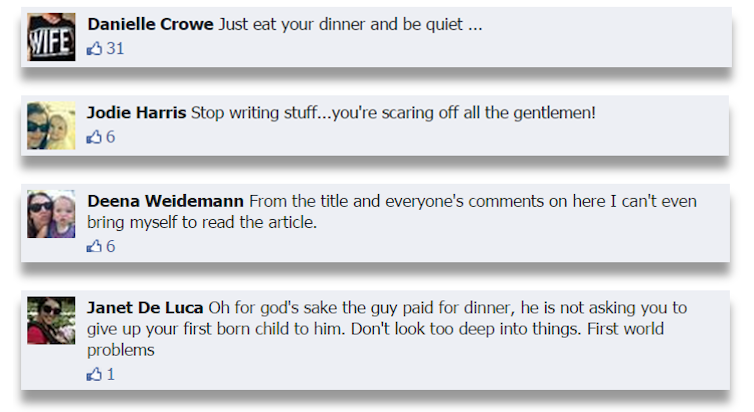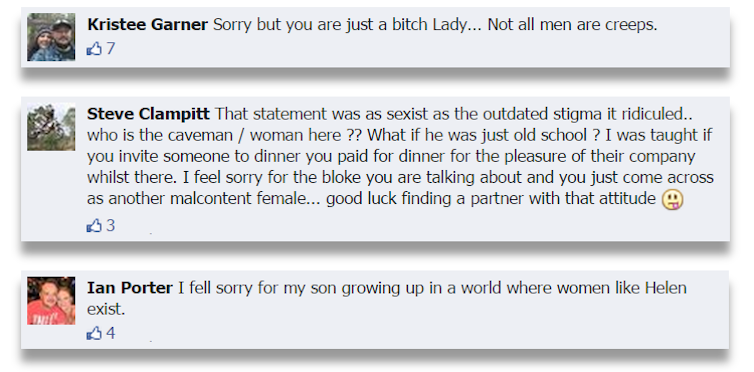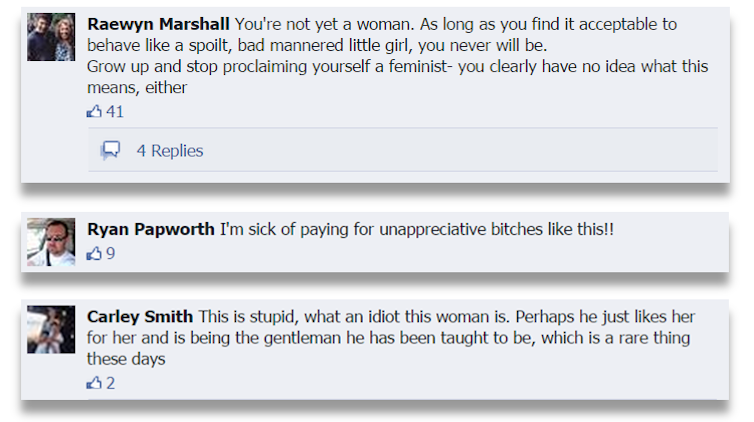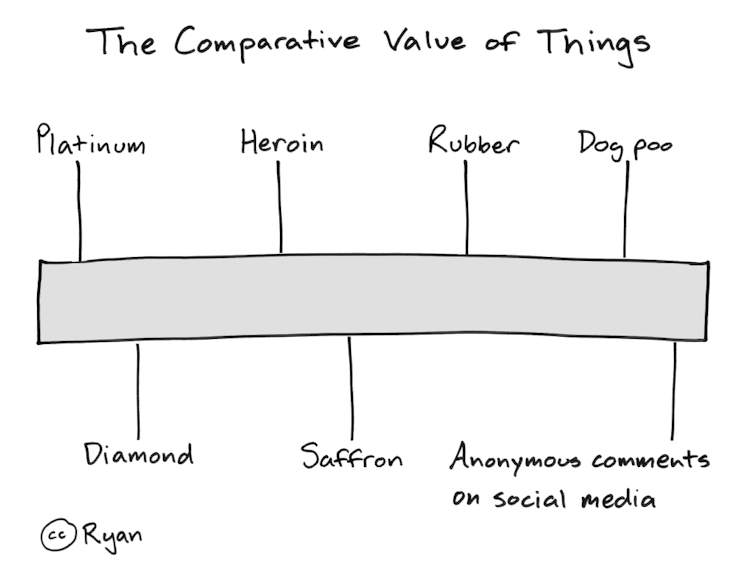Five Ways to Fight Online Abuse with Good Manners
Five ways to fight online abuse with good manners

Online and social media’s capacity to enable anyone to communicate their ideas and views is much celebrated. So why do so many people feel nervous about getting involved with online debate?
Too often, the reason is they have had vitriol poured all over them, or seen that happen to others.
This was the experience of one of this article’s authors (Helen), who recently wrote an opinion piece for a popular Australian website, Mamamia, which ran with the headline Why I’d never be with a man who always pays the bill. And the public response to what was her first foray into writing for a major website left her wondering if it’s worth repeating the exercise.
Beyond this single anecdotal example – just one of the millions of blog posts and articles published every day around the world – why does online incivility matter?
It matters, in part, because recent research has shown that the content and tone of comments on articles can actually affect the way people read and interpret the original article.
One online experiment examined attitudes to nanotechnology by taking a neutral blog post on the subject and exposing its participants to either rude or polite comments to see if it affected their views. The research revealed the “Nasty Effect”, showing that:
[…] those who are exposed to uncivil deliberation in blog comments are more likely to perceive the technology as risky than those who are exposed to civil comments.
So what each one of us posts online matters. And as we’ll show, there are ways to improve the general standard of online comments and to not let trolls get the better of you.
Faceless bullying
Sociological discussions of incivility have tended to focus on everyday urban encounters between people in spaces such as streets and public transport.
But although urban incivility attracts a great deal of attention and may result in action by the police, the practice of aggressively insulting strangers is being given a new lease of life online.
As is common in such pieces of “confessional journalism”, when writing for Mamamia Helen used examples from personal experience to dissect broader social values: in this case, gendered assumptions about who pays for restaurant meals. It was intended to be a critique of gender inequality wrapped in the garb of benevolent sexism.
The response from readers in the comments below the article and particularly on Mamamia’s Facebook page was frequently savage. While it was a bruising surprise for Helen, sadly when you look at online comments around the world, the comments she got were not particularly unusual.
That prompted us to reflect on some examples of how online media can easily function as a vehicle for harshness and abuse, often against – as well as by – women.
Demanding silence: ‘just eat your dinner and be quiet’
A favourite technique in the incivility repertoire involves undermining the legitimacy of the author to say anything at all on the subject.

In statements such as “Just eat your dinner and be quiet” and “first world problem”, hostile commenters are essentially demanding muteness.
Telling the speaker explicitly or implicitly to shut up means that there is no need to engage with what they have actually said.
Curiously, this response can be triggered among those who have not read the original article, but have caught the wave of author-baiting – this is incivility by proxy.
Name-calling: ‘you are just a bitch’
Several commenters bemoaned the confusion that the article would prompt amongst men, whose embattled masculinity had received a below-the-belt blow.

By being “bitchy” and “another malcontent female”, the author was confounding men and letting the side down for women who want to be pampered by them.
A “man-hating” attitude – seemingly interpreted as any questioning of men’s conduct – somehow justified expressions of hatred from commenters.

In the absence of the constraint of having to look someone in the eye when spitting venom at them, keyboard warriors can unload freely on others with little recourse for the target.
There is a growing back catalogue of experiences of women being the subject of online assaults that challenge not only their arguments, but their right to speak at all.
It is now routine for incivility to pass for critique when historically marginalised groups such as women freely express their opinions.
The circuits of privilege and power that exist offline are easily replicated in a digital universe, where the heedless slam-dunking of strangers is a sport designed to enforce a code of silence and submission.
You’re the problem: ‘she should have taken more control’
Incivility can also masquerade as being ostensibly helpful by not being openly hostile.
Some readers seem sympathetic and suggest remedies that involve behaviour modification on the woman’s part; for example, that she needs to be less complicit, more assertive, and a better negotiator.
Suggesting that it is all a matter of the woman’s individual responsibility, and leaving her date’s behaviour unquestioned, de-politicises and de-contextualises the issue of gender equality that was raised in the first place.

Five tips for handling incivility
So what is to be done? While there are many common types of incivility, authors and commenters need not surrender to them. Here are five ways to say no, politely, to online incivility.
1. Take responsibility for a good quality conversation
Online environments can be polluted like any other, and dumping insults on fellow humans can only result in a degraded public culture.
Think first, type later.
2. Remember the human being behind the screen
Authors bleed when cut by cruel words, but uncivil commenters may think they’re just “gaming”. Recognise that the pleasure rush of the snide put-down has a human cost.
3. Apply the in-person test
If as original author or commenter you would not say to someone’s face what you would happily post, you probably having nothing worthwhile to say.
Even Queen Elizabeth famously got trolled when she sent her first tweet. But as the Palace later pointed out, for every rude remark there were many more positive responses.
4. Take pity on trolls: they’re often unhappy people
Instead of fretting too much about comments from uncivil, anonymous people, read up on some of the many cases where they have been exposed. Some are funny, such as the case of the boxer who tracked down his troll and won a grovelling public apology.
There are also many cases where seemingly ordinary people have taken their frustrations out on others online, without considering the harm they could do to others or themselves.
Examples include the 2012 exposure of “the biggest troll on the web”. He turned out to be a middle-aged man from Texas who begged not to be unmasked and subsequently lost his job over online behaviour including posting “jailbait” images of underage girls.
There was also a tragic case of a church-going Englishwoman in her 60s, Brenda Leyland, who had obsessively attacked missing girl Madeleine McCann’s parents using an anonymous Twitter account @Sweepyface. Leyland recently committed suicide after her real identity was revealed.
5. Don’t be cowed by cowards
Online bullies, especially those who hide behind pseudonyms and avatars, have all the courage of the playground legends who never pick a fight that they might lose. Your persistence in not giving up your right to join online debates means that they picked on the wrong person.
Online incivility and its ugliest side, trolling, are seen by some as the norm rather than as aberrant. But it often has consequences.
Calling out online incivility for what it is and insisting on basic standards of respect for others does not impede robust debate – it’s vital for sustaining it.
Further reading
What I learned from debating science with trolls
Editor’s note: Showing respect for others and taking responsibility for the quality of the conversations you take part in are among the most important guidelines for comments on this site too – all outlined in The Conversation’s Community Standards.![]()
David Rowe, Professor of Cultural Research, Institute for Culture and Society, Western Sydney University and Helen Barcham, PhD candidate , Macquarie University
This article is republished from The Conversation under a Creative Commons license. Read the original article.
Không có nhận xét nào: